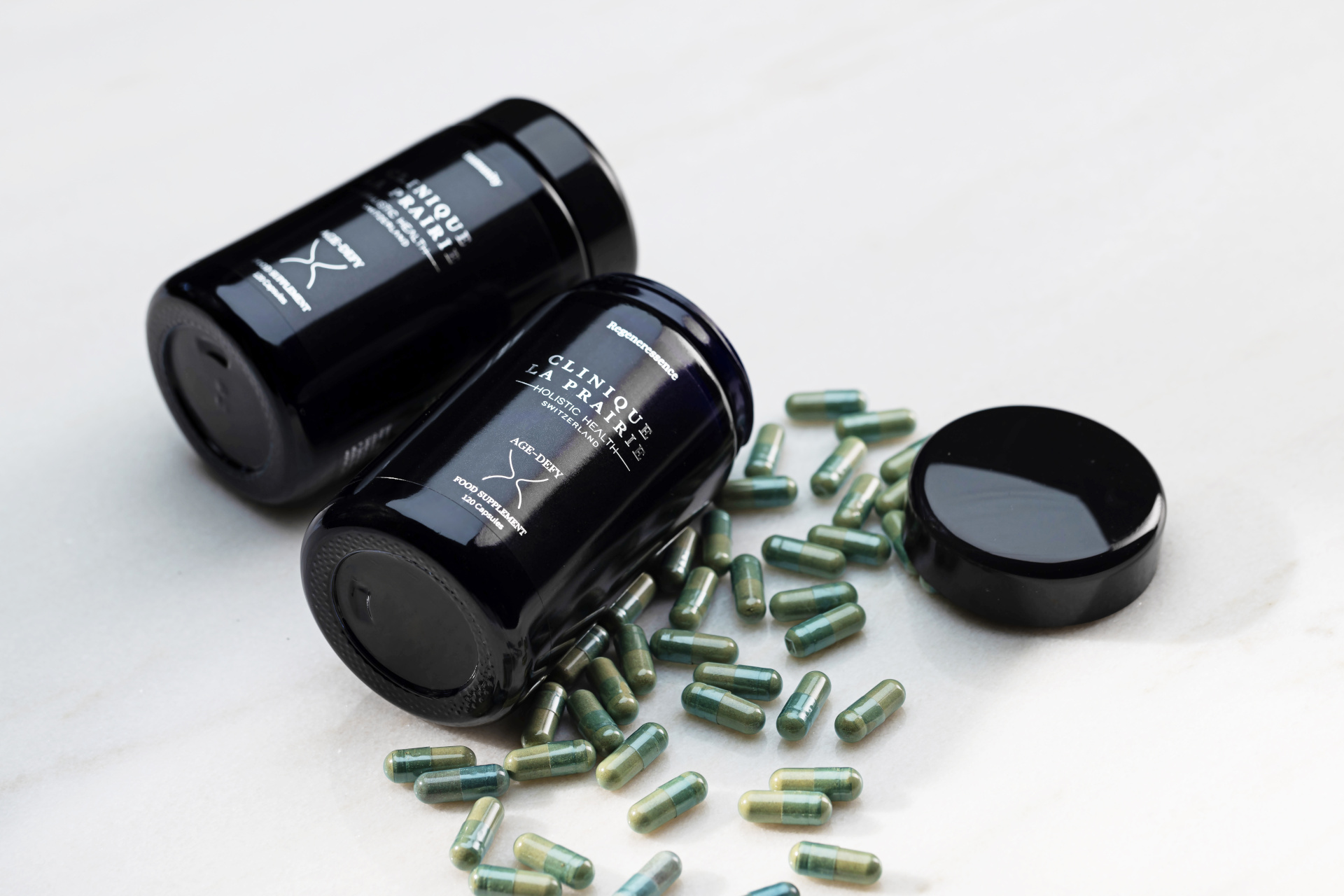
Ask The Expert: How Does Nutrition Empower Our Health?
By
10 months ago
Good nutrition goes well beyond what's on your plate
Let’s face it, planning out a healthy plate is not always the easiest task. But when it comes to nutrition, it’s better to make those longevity-boosting decisions sooner, rather than later. But where do we start? Olga Donica, Longevity Innovation Director at Clinique La Prairie, answers all of our questions surrounding diet, supplements and exercise.
A Guide To Good Nutrition (& How To Get It)

(c) Brooke Lark, Unsplash
We all now know nutrition is vital when it comes to empowering our health, but can you tell us why?
Nutrition is fundamental in shaping our metabolism and preventing diseases. It regulates almost all inner processes, with an impact on metabolic health, inflammation, gut health, repair processes and performance. Nutrients are used to build cellular membranes, to activate enzymatic systems, to enable electric impulses, to generate energy and to contribute to defence and protection.
A number of different factors can impact how much nutrients we need on a daily basis. Age significantly influences the amount of nutrients we need and nutrition must be used as a preventative tool to enhance health, correct disruptions and prevent age-related diseases. Nutrients assimilation (absorption, metabolism and storage) is also strongly influenced by our genes, and the way nutrition impacts our health is highly individual.
With this in mind, what role does nutrition play when it comes to longevity?
By empowering individuals with the knowledge and tools to make informed nutrition choices, both diet and nutraceuticals (the supplements we take are as important as the food we eat), we help them take proactive steps towards a healthier, longer life.
Any longevity intervention should start in the gut. Gut health is literally your passport to longevity, as gut microflora is central to regulating immunity, inflammation and homeostasis. The nutrients that nourish the beneficial bacteria in our gut typically come from highly pigmented plants, as well as beta-glucans found in fibre-dense foods; oats and berries are good ones to keep on your grocery list.
The most surprising thing we’ve come to learn as a longevity clinic is how fast diet shapes an individual’s health. We can measure this with epigenetics – the methylation process that is deeply affected by the exposome, or the environment. From our experience in measuring epigenetic changes caused by the diet, we know that we need as little as six months to measure methylation changes in our body; in other words, the diet can shift the health of your cells in only six months, while other lifestyle interventions can take several years or decades to cause a positive impact.
Let’s talk diets. There’s been a lot of debate around protein intake and whether a plant-based diet can really work. What’s your take?
Aging is associated with health decline and pronounced chronic low-grade inflammation, a major characteristic of aging, contributing to age-associated frailty, morbidity and mortality. Foods that we eat will impact this process in a more or less significant manner. Protein is the central piece of this health puzzle. The quality, as well as the quantity, of the protein you take will differently impact your health and metabolism.
Higher animal protein intake has been associated with higher concentrations of certain circulating inflammatory biomarkers, such as C-reactive protein (CRP), and a higher concentration of pro-inflammatory bacteria in the gut – while a higher proportion of plant protein intake is associated with lower risk of inflammation.
A plant-based diet doesn’t always mean a vegan diet, at least in our protocols. A plant-based diet comprises a higher proportion of plant protein and with a reduction (but not an elimination) of animal protein, by choosing the animal protein with less inflammatory potential – usually fish, poultry and eggs.

(c) Sara Dubler, Unsplash
There’s also been a buzz around the idea that we should be eating 30 different plants a week – is this something we should be doing? Any tips on how we can do it?
I would dare to say 30 plants a day! The number of different plants we eat per day is so important – and trust us when we say it’s easy to achieve. Start by never repeating an ingredient in your daily menu.
Ready to count? Breakfast menu: cinnamon porridge, a hand of mixed nuts, some berries and a nice cup of good green tea. That’s already seven to 10 plants.
You must keep cheating on your favourites: never use the same oil, same spice, same vegetable or same fruit in a day. The nutritional diversity brings a large amount of natural bioactive ingredients with strong therapeutic potential.
Food labels give us some insight on how nutritious a food item is, but they can sometimes be confusing. What should we be looking out for when it comes to working out a food item’s nutritional value? And what should we stay away from?
This is a topic of self-discipline! For once and for all: please read the labels of the food you are about to put in your grocery basket. We promise you will get the full benefit.
Reading food labels helps us understand the nutritional value of food items by providing information on calorie content, macronutrient composition (proteins, fats, carbohydrates) and essential vitamins and minerals. Moreover, this enables us to make informed dietary choices, as well as identify hidden or unknown ingredients such as additives, food flavouring, transformed sugars, hidden salt and modified fats.
Do not buy or eat foods with ingredients that you cannot read or recognize in the list of ingredients.
Finally, ask yourself: do you know where your food comes from?
Is food alone enough when it comes to maintaining our nutrition?
The nutritional density of our food changed significantly in the last 100 years. High yield farming, depleted soils, absence of seasonality, use of pesticides, chemical contamination and premature harvesting might trouble the idealistic picture of healthy eating. Additionally, incorrect food manipulation and aggressive cooking processes (many of us still don’t know how to properly cook our food) induce considerable nutrient loss and degradation. Iron, magnesium, water soluble vitamins, and phytochemicals are all suffering significant loss, for example.

Can supplements help with our health and longevity?
Food is your foundation and comes first as medicine, but dietary supplements are a powerful yet complementary tool to up your wellbeing game from there.
How can we know which is the right supplement to take?
Every person’s health case is unique and will have different requirements for healing and optimisation. Planning an effective yet manageable supplement routine is both an art and a science.
We differentiate two types of supplements in the market:
- Short-Term Nutritional Deficiency Correction: These supplements are designated for correcting nutritional deficiencies. They are typically taken at a higher dosage and should be consumed within a limited time frame. Usually, they target the correction of a problem (a deficiency) and are not recommended for long term use to avoid toxicity.
- Long-Term Overall Health: These are advanced supplements with a high diversity of ingredients. They are typically taken at a moderate (yet effective) dosage and can be used as part of a long term approach to optimal body health without causing toxicity. These should be used on top of a healthy diet and balanced lifestyle.
Is there a ‘one solution fits all’ approach when it comes to nutrition?
One solution does not fit all. Precision nutrition is the emerging approach for prevention that takes into account a number of factors that impact nutrition, including an individual’s variability in genes, environment and lifestyle.
Intermittent fasting is such a great example of showing that one diet does not fit all; it seems that fasting doesn’t benefit us all and will impact our individual performance.

(c) Emma Simpson, Unsplash
Is exercise related to nutrition? How do the two support each other?
Nutrition and movement are two fundamental pillars that are highly interconnected. The combination of regular exercise and an anti-inflammatory diet is the key for longevity, as exercise and nutrition are closely related.
Proper nutrition fuels physical activity, enhances performance and aids recovery by providing essential nutrients for muscle repair and energy replenishment. Conversely, regular exercise improves metabolic health, lipid profile, sleep and cognitive health, creating a synergistic effect that promotes better longevity.
Have you noticed any recent online trends about nutrition or supplements that are actually myths?
I’m afraid there are too many! Maybe a thought on the current noise around longevity solutions. Biologically, aging is a complex process with several interconnected pathways that occur in each and every cell of our body. Also, we are all aging differently. Approaching aging to enhance longevity by taking a supplement with one magic ingredient won’t be wise. We will need a multidimensional approach – one that extends to sleep, stress, pollution and more – while the nutraceutical solutions will need to be very strategic.
About The Expert
Olga Donica is the Longevity Innovation Director at Clinique La Prairie, where she leads the life science and nutrition teams alongside collaborations with the brand’s scientific committee. Her journey started with a nutritionist degree, which led her to pursue a passion for all research and sciences related to holistic health. Donica’s expertise encompasses the potential and applicability of precision medicine, nutrition and advanced technologies into pioneering clinical approaches. Her current focus is on fostering the innovative approach of longevity, a field that is shaped by continuous scientific findings.
Featured image: Mariana Medvedeva, Unsplash










